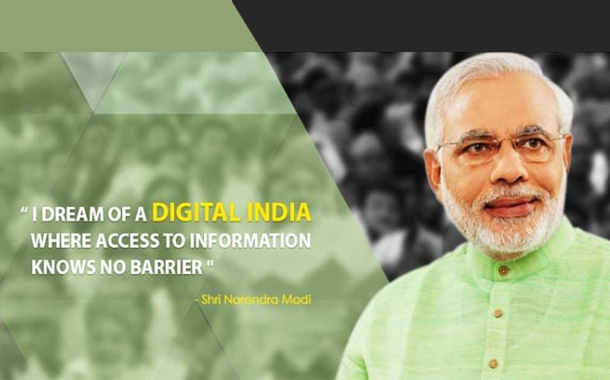The Lok Sabha election results of 2019 saw Narendra Modi coming back to power. Rest assured, India will continue on its journey for digital transformation which was started by the previous government led by BJP’s Modi. The future of tech companies who are readying themselves for the booming Indian digital market, will find this news welcoming as without the support of the central government, it is difficult to get things approved and started. With Modi coming back, who is an ardent advocate of India becoming more digital, the country will surely see new policies come to light which will help India achieve that goal. India is sorely in need of a government that will support new technologies being introduced and will provide the back work for the tech giants to get their innovations off ground.
Suman Reddy, MD, Pegasystems India, said, “The government, through a range of forward-looking policies has a track record being a catalyst to the IT sector in India. This growth has, in turn increased the industry’s share in the country’s GDP. The results give us hope that the groundwork laid during the previous regime will translate to an improved policy environment and faster industry growth over the next 5 years. Every player in the industry is looking to operate in a competitive environment, find market opportunities to grow, and create jobs. Companies have seen the fruits of a favorable business climate created and are working towards the united goal of creating a trillion dollars of economic value through the digital economy by 2025. They also look forward to adequate levels of protection to maintain India’s competitive advantage over other regional tech hubs and respect the interest of consumers using their services.
What we look forward to from the next phase of India’s governance:
- Extend the success of various initiatives and policies already introduced, like Digital India and Startup India.
- A balanced interests of the customers and enterprises, in terms of data governance, data storage, support for startups in emerging technologies.
- Further clarity on AI innovation focus by the government through regulations and initiatives as the global AI race heats up.
- Fair operating environment for startups and SMEs to scale, expand globally, and raise investments
- Improving clarity around key regulations necessary for large tech centres to operate, expand and contribute to the national economy.”
Kishan Jain, Director, Goldmedal Electricals said “The rapid proliferation of new technologies such as internet of things, artificial intelligence, connected devices & home automation, have provided FMEG companies tremendous opportunities to grow, flourish and expand into newer industry segments. Additionally, the past few years have seen the Government of India having a keen focus on the promotion of energy efficient solutions such as LED lighting. With the current Government all set for a second term in office, we hope that this trend continues as it would give further fillip not only to the manufacture of such products but also to the Government’s ‘Make in India’ and ‘Smart Cities’ initiative.”
Jitendra Chaturvedi, Director and Co-founder, Batooni Mobile Advertising said, “The government had started smoothening the tax issues in startup funding. Continuation of the regime will hopefully hasten the change in the procedures and laws helping startup funding. BJP’s known penchant for advertising is very good news for adtech start-ups.”
[quote font=”tahoma” font_size=”13″ font_style=”italic” color=”#262626″ bgcolor=”#f2f2f2″]
 Bhavin Turakhia, CEO, Zeta & Flock says, “In the last four years, Indian B2B startups have more than tripled. Our country is now taking giant strides towards becoming one of the fastest growing startup hubs globally. To make this a reality and accelerate their growth, the new Government of India must put in place measures such as training hubs for entrepreneurs across India to ease flow of capital, regulatory compliance and more. Further, these hubs must act as one-stop knowledge, research and development centers so that startups can focus more on innovation and less on processes. Thus, acting as a catalyst or emerging startups across sectors.”
Bhavin Turakhia, CEO, Zeta & Flock says, “In the last four years, Indian B2B startups have more than tripled. Our country is now taking giant strides towards becoming one of the fastest growing startup hubs globally. To make this a reality and accelerate their growth, the new Government of India must put in place measures such as training hubs for entrepreneurs across India to ease flow of capital, regulatory compliance and more. Further, these hubs must act as one-stop knowledge, research and development centers so that startups can focus more on innovation and less on processes. Thus, acting as a catalyst or emerging startups across sectors.”
[/quote]
Satyam Kumar, CEO & Co-Founder, LoanTap Financial Technologies Pvt. Ltd says, “Currently, a start-up needs to follow number of compliance laid down by various regulatory bodies as well as there is a knowledge gap because of multiple points of contact. While they are definitely necessary, they are onerous and costly to comply with. Compliance is expected with regards to Labour Law, MSME Registration, Investment, MCA Compliance as well as ones related to individual sectors. There should also be consideration on hefty penalty in cases of non-compliance.
Expectation from Government is to make process simpler to comply with – A single clearance window – which ensures end to end solution or procedure to be followed by a start-up that enables pro-active compliance as well as helps to avoid unnecessary costs.”
[quote font=”tahoma” font_size=”13″ font_style=”italic” color=”#262626″ bgcolor=”#f2f2f2″]
 Javed Tapia, Founder, Slonkit says, “The current government has given a fillip to startups with initiatives such as Start-Up India which enables self-certification, rebate in filing patents, income tax exemptions, easier public procurement norms etc. I think the new government should further enhance the vibrant start-up ecosystem wherein startups can collaborate seamlessly and share knowledge and technical expertise. This will help India to leverage it’s entrepreneurial potential and become a hotbed of unicorn start-ups across different sectors.”
Javed Tapia, Founder, Slonkit says, “The current government has given a fillip to startups with initiatives such as Start-Up India which enables self-certification, rebate in filing patents, income tax exemptions, easier public procurement norms etc. I think the new government should further enhance the vibrant start-up ecosystem wherein startups can collaborate seamlessly and share knowledge and technical expertise. This will help India to leverage it’s entrepreneurial potential and become a hotbed of unicorn start-ups across different sectors.”
[/quote]
Ankur Pahwa, Partner and National Leader – E-Commerce and Consumer Internet, EY India, said
“As the new government steps-in, among key policy interventions, the e-commerce policy needs some urgent attention as it can propel investments, job and wealth creation to boost overall economic growth. The e-commerce policy also need to take into account the view of impacted stakeholders and provide sufficient runway for implementation. Furthermore, incentives to companies exploring ‘deep-tech’ such as AI, ML, IoT, etc., will bring in more efficiency in the system and ultimately improving customer experiences. India remains the world’s second largest start-up nation and clearly the government has had the right intent to boost start-ups in the country to foster innovation and job creation, while protecting both investors and entrepreneurs. While measures have been taken to provide relaxation from Angel Tax, there are still some unfulfilled expectations linked to its simplification when looked at from a long-term lens. More attention is needed to protect entrepreneurs; at the same time enable promoters and investors to raise capital through differential voting rights. While the government has made considerable and commendable headway in ease of doing business, further steps linked to easing of norms will fuel the start-up ecosystem.”
[quote font=”tahoma” font_size=”13″ font_style=”italic” color=”#262626″ bgcolor=”#f2f2f2″]
 Juergen Hase, CEO, Unlimit said, “The Indian start-up sector have already been ignited in the past five years with favourable policies around taxation, investments, ease of doing business, incubation, foreign capital, cross border, startup lobby groups, industry associations. The foundation of the of the ecosystem is already in place with India being the third largest hub for start-ups globally. Active government involvement is the need of the hour to resolve challenges such as unemployment, and funding for the growth of the industry and the economy at large. For start-ups to flourish it is imperative to create an environment that is conducive to physical, offline small businesses and hardware product firms operating locally. The new government should continue with initiatives such as Make in India and Digital India to aid the growth of the start-up industry and also work towards a digital economy by installing proportionate methods to tackle policy challenges.”
Juergen Hase, CEO, Unlimit said, “The Indian start-up sector have already been ignited in the past five years with favourable policies around taxation, investments, ease of doing business, incubation, foreign capital, cross border, startup lobby groups, industry associations. The foundation of the of the ecosystem is already in place with India being the third largest hub for start-ups globally. Active government involvement is the need of the hour to resolve challenges such as unemployment, and funding for the growth of the industry and the economy at large. For start-ups to flourish it is imperative to create an environment that is conducive to physical, offline small businesses and hardware product firms operating locally. The new government should continue with initiatives such as Make in India and Digital India to aid the growth of the start-up industry and also work towards a digital economy by installing proportionate methods to tackle policy challenges.”
[/quote]
Rohit Manglik, CEO, EduGorilla said, “The Modi-led government had taken proactive steps to create an enabling ecosystem for startups. We hope that the second term of the Modi government would lead to continuity in the efforts to bolster startups. We expect the government to be responsive to regulatory issues faced by entrepreneurs. A conducive e-commerce policy and attracting more investors into the startup ecosystem need attention from the government. In the area of education, there is a need to incentivize upskilling of the workforce and align the curriculum to the requirements of the industry. ”
[quote font=”tahoma” font_size=”13″ font_style=”italic” color=”#262626″ bgcolor=”#f2f2f2″]
 K R Naik, Chairman, DIGISOL Systems Ltd., said, “We have seen enormous growth opportunities in the past five years with the introduction of schemes like ‘Make In India’, ‘Digital India’ and ‘Smart Cities’. With the continuation of the regime, we hope to see a new wave of transformation in the IT Networking Industry. We are excited about the opportunities coming in the next few years as supportive government regulations will help accelerate the business growth and would support companies like us who have been manufacturing products in India.”
K R Naik, Chairman, DIGISOL Systems Ltd., said, “We have seen enormous growth opportunities in the past five years with the introduction of schemes like ‘Make In India’, ‘Digital India’ and ‘Smart Cities’. With the continuation of the regime, we hope to see a new wave of transformation in the IT Networking Industry. We are excited about the opportunities coming in the next few years as supportive government regulations will help accelerate the business growth and would support companies like us who have been manufacturing products in India.”
[/quote]
Keshab Panda, CEO & Managing Director, L&T Technology Services said, “This election is a victory for Indian democracy and the people’s mandate. A stable and clear majority is always beneficial to business and international trade and commerce. As India builds up on its global position of being a leader in new-age innovations, it is the right time to leverage the country’s unique capabilities to serve as a best-in-class ER&D services destination. We can expect to see growing demand for technology expertise in several critical areas such as smart cities, connected healthcare and Electric Vehicle technologies, backed by the Government’s active policy framework. We foresee technology companies coming out with digital engineering solutions catering to all of these in the coming years.”


